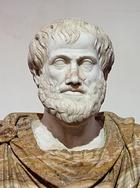
Aristotle (Greek ancient Ἀριστοτέλης, Aristotélēs) (.. 384 BC - 322 BC) was a polymath: philosopher, logician and scientist of ancient Greece whose ideas have had an enormous influence on the intellectual history of the West for more two millennia.
Aristotle wrote about 200 treatises (of which we have only reached 31) on a wide variety of topics including logic, metaphysics, philosophy of science, ethics, political philosophy, aesthetics, rhetoric, physics, astronomy and Aristotle biología.1 transformed many, if not all, areas of knowledge touched. He is recognized as the founding father of logic and biology, because although there are reflections and previous writings on both subjects, it is in the work of Aristotle where the first systematic research in this regard.
Among many other contributions, Aristotle formulated the theory of spontaneous generation, the principle of contradiction, the notions of class, substance, act, power, etc. Some of his ideas that were novel to the philosophy of his time, now part of the common sense of many people.
Aristotle was a student of Plato and other thinkers (such as Eudoxus) during the twenty years he spent at the Academy of Athens. He was teacher of Alexander the Great in the Kingdom of Macedonia. In the last stage of his life he founded the Lyceum in Athens, where he taught until a year before his death.




